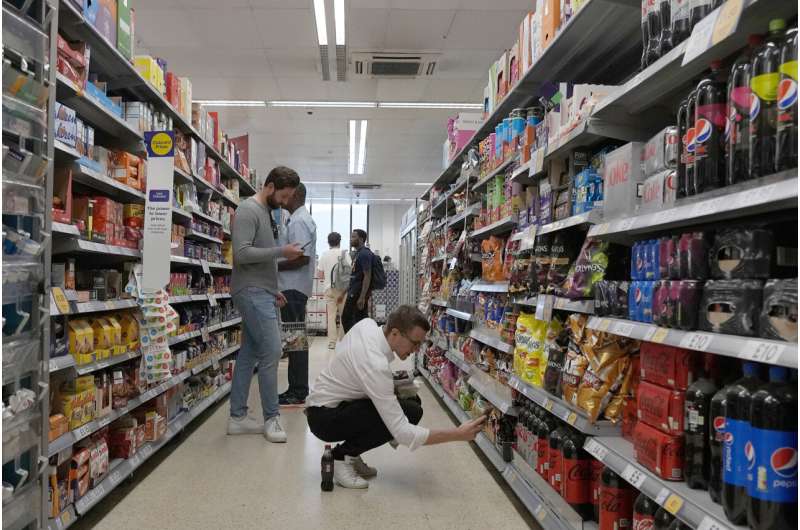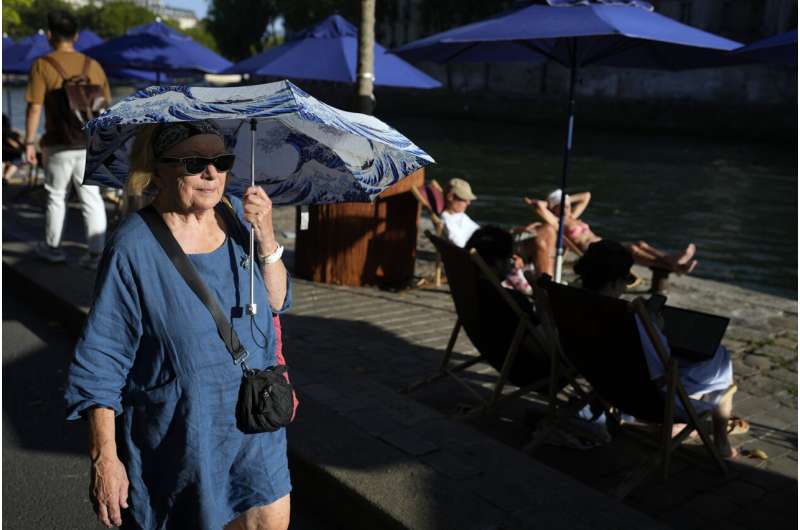This article has been reviewed according to Science X's editorial process and policies. Editors have highlighted the following attributes while ensuring the content's credibility:
fact-checked
peer-reviewed publication
reputable news agency
proofread
Higher temperatures mean higher food and other prices. A new study links climate shocks to inflation

Food prices and overall inflation will rise as temperatures climb with climate change, a new study by an environmental scientist and the European Central Bank found.
Looking at monthly price tags of food and other goods, temperatures and other climate factors in 121 nations since 1996, researchers calculate that "weather and climate shocks" will cause the cost of food to rise 1.5 to 1.8 percentage points annually within a decade or so, even higher in already hot places like the Middle East, according to a study in Thursday's journal Communications Earth & Environment.
And that translates to an increase in overall inflation of 0.8 to 0.9 percentage points by 2035, just caused by climate change extreme weather, the study said.
Those numbers may look small, but to banks like the U.S. Federal Reserve that fight inflation, they are significant, said study lead author Max Kotz, a climate scientist at the Potsdam Institute for Climate Impact Research in Germany.
"The physical impacts of climate change are going to have a persistent effect on inflation," Kotz said. "This is really from my perspective another example of one of the ways in which climate change can undermine human welfare, economic welfare."
And by 2060, the climate-triggered part of inflation should grow, with global food prices predicted to increase 2.2 to 4.3 percentage points annually, the study said. That translates to a 1.1 to 2.2 percentage point increase in overall inflation.
Gernot Wagner, a climate economist at Columbia University's business school who wasn't part of the research, said what he calls "climateflation" is "all too real and the numbers are rather striking."
Kotz and European Bank economists looked at 20,000 data points to find a real world causal link between extreme weather, especially heat, and rising prices. They then looked at what's projected in the future for climate change and saw sticker shock.
Usually when economists talk inflation and climate change, it's about rising energy prices in response to efforts to curb warming, but that's only part of the problem, Kotz said.

"There are these productivity shocks that we know about from climate change, from the weather phenomena caused by climate change, from heat waves and so forth to reduce agricultural productivity," Kotz said. "Those also then have a knock-on effect on food inflation, on headline inflation."
The study points to 2022's European heat wave as a good example. The high heat cut food supplies, causing food prices to rise two-thirds of a percentage point and overall inflation to jump about one-third of a percentage point, Kotz said. Prices rose even higher in Romania, Hungary and parts of southern Europe.
"I find the main result on the historic relationship between regional temperature anomalies and national inflation to be credible," said Frances Moore, an environmental economist at the University of California, Davis who wasn't part of the study. "The findings are important. Price variability in essential goods like food is very painful to consumers."
Kotz said the analysis found the inflationary pressure on food and other prices is worse in areas and seasons that are hotter. So Europe and North America may not be hit as hard as the Global South, which could afford it less, he said.
More information: Maximilian Kotz et al, Global warming and heat extremes to enhance inflationary pressures, Communications Earth & Environment (2024). DOI: 10.1038/s43247-023-01173-x
Journal information: Communications Earth & Environment
© 2024 The Associated Press. All rights reserved. This material may not be published, broadcast, rewritten or redistributed without permission.





















